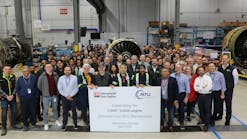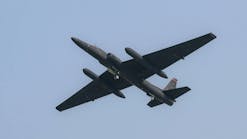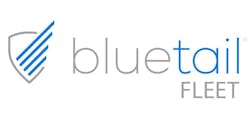Beyond the Façade: Smith family helps turn the Hickory, NC airport into a first-class business facility
Beyond The Facade
Smith family helps turn the Hickory, NC airport into a first-class business facility
The $1 million, 12,000-sq.ft. terminal is Hickory Regional Airport's new gateway to the community. Jointly financed by the city and the FBO, it will serve as the anchor of a new Phillips 66 Aviation Performance Center.HICKORY, NC - In 1996, Carroll Smith, then 62, decided to get into the FBO business after a career as a corporate pilot and aircraft technician. "I wanted something to keep me occupied during retirement," he explains. Today, he and his two sons, Brent and Wayne, head up a first-class fixed base operation that specializes in King Air maintenance, and has 13 business aircraft in a sister division that focuses on aircraft management and charter. They recently opened a new terminal facility under a joint agreement with the City of Hickory, which sees the airport as a cornerstone of economic development.
Hickory Regional Airport
is a rather traditional looking airport in a traditional manufacturing
town, situated in west central North Carolina. An area long known for
its furniture manufacturing and distribution, it in recent years has seen
its economy heavily influenced by high-tech, cable, and fiber optics.
When the tech bubble burst, Hickory like many communities was severely
affected, and unemployment remains at some 10 percent as a result.
Enter the airport and its role as economic catalyst. At the same time,
the PGA Champions Tour inaugurated the annual Greater Hickory Classic
at Rock Barn, featuring golf's top senior pros. Combined, the reasons
motivated the city and FBO to join forces on a new entryway to the community
for the pro golfers and other economic interests. The result: a 12,500-sq.ft.,
$1 million terminal that says business, not airport.
Aircraft, Then FBO Services
Carroll Smith served as a flight engineer and technician in the U.S. Navy
before moving onto the airlines, Stevens Aviation, and finally a series
of corporate flight departments. Along the way, he moved from wrenches
to right seat to left, making a career as a corporate pilot.
He first got into aircraft and hangar management at Hickory Regional in
1993. In 1996 he purchased the existing FBO on the field, Catawba Valley
Aviation, for $1 million, according to son Brent, who manages the FBO,
Profile Aviation Center. Carroll heads up the charter and aircraft management
firm, Profile Aviation Services, while son Wayne is a technician at the
FBO.
According to Brent, the company today has annual revenues of some $10
million, with the FBO pumping some one million gallons of fuel annually.
Carroll Smith, founder
A Diverse Complex
A first-time visitor to Profile Aviation's complex is struck, of course,
first and foremost by the impressive and dominating office gateway that
is the new terminal. It's unlike most - it is large, modern, and genteel
all at once. In effect, it was designed with the PGA in mind.
There are acres of ramp, the likes of which FBOs at airports this size
only dream of. Across from the new terminal sit pistons in open hangars.
And on the other side of the airfield lie Profile's new series of three
12,000-sq.ft. corporate hangars, two for storage and one for the company's
maintenance. Total hangar square footage on Profile's leasehold: 110,000
square feet.
In addition, as part of the package agreed upon by the FBO and the city
when negotiating to construct the new terminal, Profile Aviation's entire
leasehold was renegotiated and is now 25 years with two five-year options.
FBO-City Joint
Venture
"The previous
building that we were in was wholly owned by the city," explains
Brent Smith. "It had reached the point that it didn't make any sense
to the city planners to put any more money into that building. Instead,
they felt their money was better spent on a new facility. We agreed."
He says the city "paid about half" of the $1 million construction
cost, and will have its economic development initiative based in 3,000
square feet of the terminal. Other than the initial half million dollar
investment, says Smith, the FBO has no other ongoing costs to the city
for the new facility.
Explains Brent, "The Economic Development Commission is looking to
attract businesses to the area that will diversify the region. Hickory
has always been a big manufacturing city, not so much a service-oriented
town. The decisionmakers for those industries come right through our doors.
We really wanted the facility to represent the entire community with an
image that portrays progressiveness."
Despite weather delays, the terminal was built in nine months and came
in under budget, he says.
Market Niches
The Smiths see their greatest growth potential in maintenance, primarily
for King Airs, Citations, and Learjets, as well as with aircraft management
and charter.
Carroll Smith says the company has had success marketing aircraft services
to race car teams, many of which are based in Charlotte some 50 miles
to the southeast. He also sees strong potential with college sports teams
for charter. "We are looking for larger airplanes now for the charter
business," says Smith.
Of the 13 aircraft in Profile's fleet, he says, seven are owned by the
company. All 18 pilots are contract pilots, and all managed aircraft are
operated only under Part 91.
Says Smith, "We're trying to grow the company in niche opportunities,
and one of those is as a maintenance base, particularly for King Airs."
Meanwhile, the first PGA event held this past fall brought in some 35
corporate aircraft, mostly fractionals, with high-profile golfers in tow.
For the Smiths and Hickory, a new era has begun for their airport, say
the Smiths.
Of Rules and Regs ...
Profile Aviation founder Carroll Smith discusses industry issues
-
On the FAA's pending review of the FAR Part 135 regulations ...
"If it takes less paperwork, I'm for it. If it takes more, they're just trying to run us out of business.
"I can't think of anything that needs to be changed." -
On the impact of the new FAR Part 145 regulation ...
"We were ready for it. We were already set up with a good training program. It didn't create any big headaches; though it added to our costs. Quality assurance was a lot of it."










